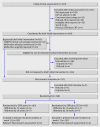Selective serotonin reuptake inhibitors (SSRIs) and routine specialist care with and without cognitive behaviour therapy in adolescents with major depression: randomised controlled trial
- PMID: 17556431
- PMCID: PMC1925185
- DOI: 10.1136/bmj.39224.494340.55
Selective serotonin reuptake inhibitors (SSRIs) and routine specialist care with and without cognitive behaviour therapy in adolescents with major depression: randomised controlled trial
Abstract
Objective: To determine whether a combination of a selective serotonin reuptake inhibitor (SSRIs) and cognitive behaviour therapy (CBT) together with clinical care is more effective in the short term than an SSRI and clinical care alone in adolescents with moderate to severe major depression.
Design: Pragmatic randomised controlled superiority trial.
Setting: 6 outpatient clinics in Manchester and Cambridge.
Participants: 208 adolescents, aged 11-17, with moderate to severe major or probable major depression who had not responded to a brief initial intervention. Adolescents with suicidality, depressive psychosis, or conduct disorder were included.
Interventions: 103 adolescents received an SSRI and routine care; 105 received an SSRI, routine care, and CBT. The trial lasted 12 weeks, followed by a 16 week maintenance phase.
Main outcome measures: Change in score on the Health of the Nation outcome scales for children and adolescents (primary outcome) from baseline with 12 weeks as the primary and 28 weeks as the follow-up end point. Secondary measures were change in scores on the mood and feelings questionnaire, the revised children's depression rating scale, the children's global assessment scale, and the clinical global impression improvement scale.
Results: At 12 weeks the treatment effect for the primary outcome was -0.64 (95% confidence interval -2.54 to 1.26, P=0.50). In a longitudinal analysis, there was no difference in effectiveness of treatment for the primary (average treatment effect 0.001, -1.52 to 1.52, P=0.99) or secondary outcome measures. On average there was a decrease in suicidal thoughts and self harm. There was no evidence of a protective effect of cognitive behaviour therapy on suicidal thinking or action. By 28 weeks, 57% were much or very much improved with 20% remaining unimproved.
Conclusions: For adolescents with moderate to severe major depression there is no evidence that the combination of CBT plus an SSRI in the presence of routine clinical care contributes to an improved outcome by 28 weeks compared with the provision of routine clinical care plus an SSRI alone.
Trial registration: Current Controlled Trials ISRCNT 83809224.
Conflict of interest statement
Figures
Comment in
-
Depression in adolescents.BMJ. 2007 Jul 21;335(7611):106-7. doi: 10.1136/bmj.39265.581042.80. BMJ. 2007. PMID: 17641303 Free PMC article.
-
Depression in adolescents: Study was not a trial of antidepressants.BMJ. 2007 Aug 4;335(7613):221; author reply 221. doi: 10.1136/bmj.39289.575058.BE. BMJ. 2007. PMID: 17673737 Free PMC article. No abstract available.
-
Adding cognitive behavioural therapy to SSRIs does not improve outcomes in adolescents with major depression.Evid Based Ment Health. 2008 Feb;11(1):13. doi: 10.1136/ebmh.11.1.13. Evid Based Ment Health. 2008. PMID: 18223048 No abstract available.
-
CBT plus an SSRI was as effective as an SSRI alone for adolescents with moderate to severe depression.Evid Based Med. 2008 Feb;13(1):13. doi: 10.1136/ebm.13.1.13. Evid Based Med. 2008. PMID: 18234921 No abstract available.
Similar articles
-
A randomised controlled trial of cognitive behaviour therapy in adolescents with major depression treated by selective serotonin reuptake inhibitors. The ADAPT trial.Health Technol Assess. 2008 May;12(14):iii-iv, ix-60. doi: 10.3310/hta12140. Health Technol Assess. 2008. PMID: 18462573 Clinical Trial.
-
Cognitive-behavioural therapy and short-term psychoanalytic psychotherapy versus brief psychosocial intervention in adolescents with unipolar major depression (IMPACT): a multicentre, pragmatic, observer-blind, randomised controlled trial.Health Technol Assess. 2017 Mar;21(12):1-94. doi: 10.3310/hta21120. Health Technol Assess. 2017. PMID: 28394249 Free PMC article. Clinical Trial.
-
Cost-effectiveness of selective serotonin reuptake inhibitors and routine specialist care with and without cognitive behavioural therapy in adolescents with major depression.Br J Psychiatry. 2007 Dec;191:521-7. doi: 10.1192/bjp.bp.107.038984. Br J Psychiatry. 2007. PMID: 18055956 Clinical Trial.
-
Antidepressants for people with epilepsy and depression.Cochrane Database Syst Rev. 2021 Apr 16;4(4):CD010682. doi: 10.1002/14651858.CD010682.pub3. Cochrane Database Syst Rev. 2021. PMID: 33860531 Free PMC article.
-
Use of selective serotonin reuptake inhibitors in children and adolescents.Drug Saf. 2004;27(13):991-1000. doi: 10.2165/00002018-200427130-00002. Drug Saf. 2004. PMID: 15471506 Review.
Cited by
-
A Pilot SMART for Developing an Adaptive Treatment Strategy for Adolescent Depression.J Clin Child Adolesc Psychol. 2016 Jul-Aug;45(4):480-94. doi: 10.1080/15374416.2015.1015133. Epub 2015 Mar 18. J Clin Child Adolesc Psychol. 2016. PMID: 25785788 Free PMC article. Clinical Trial.
-
Major depressive disorder in children and adolescents.Ment Health Clin. 2018 Nov 1;8(6):275-283. doi: 10.9740/mhc.2018.11.275. eCollection 2018 Nov. Ment Health Clin. 2018. PMID: 30397569 Free PMC article.
-
A Phase 3, Double-Blind, Randomized, Placebo-Controlled Study of Vilazodone in Adolescents with Major Depressive Disorder.Paediatr Drugs. 2018 Aug;20(4):353-363. doi: 10.1007/s40272-018-0290-4. Paediatr Drugs. 2018. PMID: 29633166 Free PMC article. Clinical Trial.
-
Therapists' techniques in the treatment of adolescent depression.J Psychother Integr. 2018 Dec;28(4):413-428. doi: 10.1037/int0000119. J Psychother Integr. 2018. PMID: 30518990 Free PMC article.
-
Enhancing the developmental appropriateness of treatment for depression in youth: integrating the family in treatment.Child Adolesc Psychiatr Clin N Am. 2012 Apr;21(2):345-84. doi: 10.1016/j.chc.2012.01.003. Epub 2012 Mar 17. Child Adolesc Psychiatr Clin N Am. 2012. PMID: 22537731 Free PMC article. Review.
References
-
- Dunn V, Goodyer IM. Longitudinal investigation into childhood- and adolescence-onset depression: psychiatric outcome in early adulthood. Br J Psychiatry 2006;188:216-22. - PubMed
-
- Fombonne E, Wostear G, Cooper V, Harrington R, Rutter M. The Maudsley long-term follow-up of child and adolescent depression. 1. Psychiatric outcomes in adulthood. Br J Psychiatry 2001;179:210-7. - PubMed
-
- Whittington CJ, Kendall T, Fonagy P, Cottrell D, Cotgrove A, Boddington E. Selective serotonin reuptake inhibitors in childhood depression: systematic review of published versus unpublished data. Lancet 2004;363:1341-5. - PubMed
-
- Dubicka B, Hadley S, Roberts C. Suicidal behaviour in youths with depression treated with new-generation antidepressants—meta-analysis. Br J Psychiatry 2006;189:393-8. - PubMed
-
- National Collaborating Centre for Mental Health. Quick reference guide. Depression: management of depression in primary and secondary care London: National Institute of Clinical Excellence, 2004. (Clinical guideline 23.) www.nice.org.uk/pdf/CG023quickreferenceguide.pdf
Publication types
MeSH terms
Substances
Associated data
LinkOut - more resources
Full Text Sources
Medical


